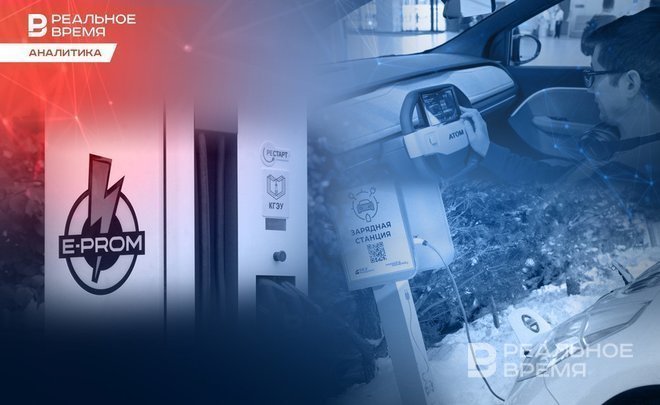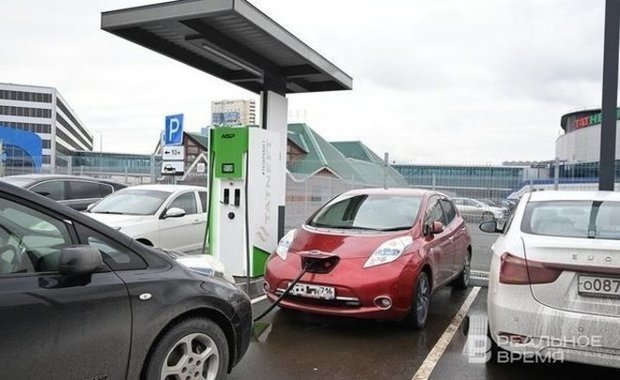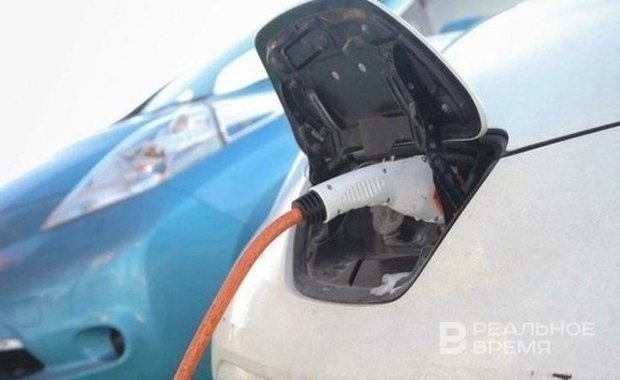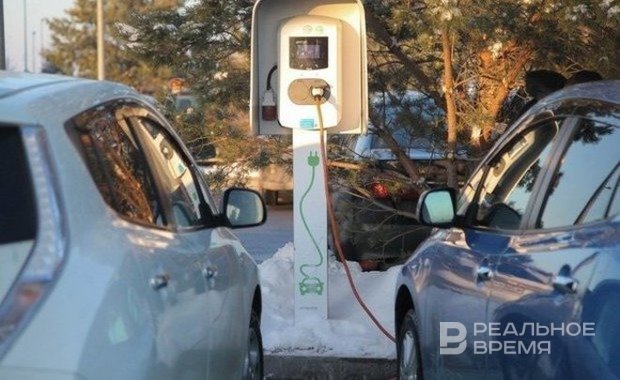Russian-Chinese Union: electric car market in Russia to be divided by two states
How did the electric car market change in 2023 and which new brands entered the Russian market

The electric car market in Russia is developing rapidly. Thanks to close cooperation with China, brands that the Russian consumer had not even suspected before entered the market. The year 2023 can also be called the first year of full-fledged mass production of electric vehicles inside the country — Evotute and electric Moskvitchs assembled in Russia began to drive on the roads of Russia. Atom is expected to be released at the end of 2024. How the electric car market grew in 2023 and what events and factors influenced it — in the review of the analytical service of Realnoe Vremya.
Russian manufacturers have almost a quarter of the market
According to analysts from the Electronic Passport Group of companies, 9,047 electric vehicles were registered in Russia in 2022, 8,513 of them — passenger cars. From January to November 2023, the fleet of passenger electric vehicles in the country increased by 12,800 electric vehicles, and of this number, the share of electric cars assembled domestically was at least 21%.
Tatarstan's market is inferior to nationwide one
According to Autostat Info, in January-October 2023, 10.7 thousand purely rechargeable electric vehicles (BEV) and 14.7 thousand hybrids (HEV and PHEV) with gasoline and diesel internal combustion engines and electric motors were sold (registered) in Russia. In total, this is only 3% of the Russian market of new passenger cars (836.9 thousand). The share of the number of electric vehicles is only 1.3%.
In the Tatarstan market, 274 electric vehicles (0.83% of the total number of cars sold) and 382 hybrids were sold in 11 months. Thus, the local market is still significantly inferior to the all-Russian one, says Alexander Klimnov, an expert at Autostat Info.

The most popular brands of electric vehicles today are Zeekr, Volkswagen, Evotute, Tesla, and Voyah. The most popular models of electric vehicles are Zeekr 001, Evotute i-Pro, and Volkswagen ID.4.
“However, in the fourth quarter, there is also an increase in registrations of the Moskvitch brand, but Volkswagen sales are slowing down, which, by the way, is quite consistent with the European trend of this brand," Klimnov notes.

“The reduction of benefits for imported electric vehicles, of course, affects the pace of market development, but the development of the charging network is much more important, and we have not actually developed it on a national scale, except for Moscow and partly St. Petersburg," Klimnov believes. “If the adopted federal and local programmes for the development of charging networks are more or less well implemented, then we can definitely say that the electric vehicle market will continue to develop quite rapidly in 2024.”
Russian consumers are being cautious
Russian consumers are still afraid to buy electric vehicles, says Iya Gordeeva, the chairman of the Association for the Development of Electric, Unmanned, and Connected Transport and Infrastructure (AETI). First of all, this is due to a lack of awareness that an electric car is quite easy to operate, and the number of charging stations today allows not only to use an electric car in the city, but also to travel comfortably enough.

Free parking in Moscow, St. Petersburg, Kazan and a number of other cities also contributed to the growth in the number of electric motorists. “For Moscow, where parking fees can be up to 500 rubles per hour, having an electric car in the family is a great help," explains Iya Gordeeva. “Free traffic on toll federal roads also plays a role, which also motivates Russians to switch to electric vehicles.”
Among other things, Iia reminds about the cost of operating an electric car — it is 4-5 times cheaper than operating a car on gasoline. “The most important savings are on mileage, because 1 km on an electric car can cost from 50 kopecks to 2-3 rubles per km if charged at expensive public charging stations," she cites an example.
According to her forecasts, the leading share of the electric car market in Russia will be occupied by Chinese manufacturers, who are very actively coming to the country.

“We expect a large influx of electric vehicles from China. Every day we hear about the opening of new salons, the appearance of new brands, that new car models are appearing and new services are opening," she lists. “And, of course, we rely on Russian manufacturers, because today quite a lot of brands either already produce electric cars, or declare that they will soon have such models.”
Another distinctive feature of 2023 was the appearance of electric commercial vehicles — trucks, special, and harvesting equipment.
“We are really looking forward to Atom, because their concept is very much in demand by the market today," says Iya. “The design of the car, which was presented at the presentations, pleases electric motorists. The car turned out to be modern, interesting structurally and technically, and, of course, the market is looking forward to this car on the roads to try it out in combat conditions.”
Everyone and his brother sell electric cars now
“If in 2022 the streets of cities were still dominated by the reliable pioneer Nissan Leaf and the attention-grabbing Tesla, and only occasionally there were European BMW i3, e-Golf, Korean Hyundai, KIA SOUL, Niro, Chinese BYD and few luxury HONGQI, as well as the officially sold Porsche Taycan and Audi Etron, then now the market is filled with high-grade Chinese cars, which are imported both by parallel import and sold through newly opened car dealerships, with talking names, such as Neoficial Auto — in the style of “The Boy's Word”. There are a lot of such private companies today," commented Rustem Galimzyanov, the representative of the non-profit organisation for the development of infrastructure for electric vehicles Restart.

These cars, often with foreigners at the wheel, regularly occupy free charging stations, taking turns with each other and leaving no chance for free electrons to ordinary electric motorists. Moskvitch is less popular on the market because, in his opinion, it is inferior to Evolute in price.
“People have become more confident in buying electric cars, observing the general trend of growth in the number of charging stations and decent service centres. I think this trend will continue, but it will be diluted by official suppliers of electric cars," he believes.

For example, KAN AUTO started selling a small and very cute Ora electric car, very similar to the Mini Cooper. Also, the WEY electric car is going to be on sale very soon. Cherry Tiggo began selling the seventh and eighth versions of its hybrid in Russia, he lists. And hybrids also need charging stations.
Every month we can observe the appearance of some new brands on the Russian market that were absolutely unknown before. Premium Chinese cars have become fashionable. For example, Zeekr, Avatr, Hi-Phi, Lotus Eletre. People began to perceive Chinese premium brands as an alternative. There was no such thing in 2022, Galimzyanov notes.
The electric car market in 2023 was also influenced by the government's decision to increase recycling fee.
“Perhaps, this will stop the ,Chinese invasion,, but this is not for sure. Now we are receiving letters from customs demanding to pay extra for recycling fee for previous periods. For example, a person paid 5,200 rubles in 2021 for a recycling fee for a Nissan Sylphy, a 2018 model produced in China. Now the customs wants to collect an additional fee and penalties for 145.43 thousand rubles from him through the court," Rustem said. “Allegedly, in 2021, they applied the wrong calculation formula for the recycling fee. Those who do not pay are sued. The court, as a rule, sides with the state. There are already many such stories in the regions.”
A year ago, it was difficult to find a charger on the track
In 2023, the market began to grow not so much quantitatively, but qualitatively. A distinctive feature of the 2023 is that people have become aware, there is a lot of talk in the media about electric cars, whole regions have appeared where large taxi companies have switched to electric cars, said Dmitry Matviyevsky, the co-founder of IT Charge.

Charging manufacturers, he said, also have a good growth. “If last year top manufacturers made dozens of stations, now they have started to produce hundreds of them," Matviyevsky notes. “And there are more manufacturers themselves, the choice is expanding. Now we can observe how one manufacturer launches several dozen stations at once in the regions.” There are new solutions appearing, informed choice, and a request from car owners for quality.
Today, few people will be surprised by an electric car
“The market has been constantly changing throughout the year. The models that were popular in 2022 have become less in demand, but new favourites have appeared — Zeekr and Lixiang," said Vitaly Evdokimov, the owner of Avtokitai electric car salon. “If last year people were distrustful of Chinese electric car brands, and European and American cars were in the lead — VW, Tesla, Audi, today we see that they have been almost completely replaced by electric cars from China.”
Evdokimov notes that today few people will challenge the dominance of Chinese manufacturers in the global automotive industry, especially electric vehicles.

The trend towards electric mobility is worldwide, he emphasises, and Russia is unlikely to go the other way. “Although not at the same pace as in some countries, more and more Russians will choose cars powered by new energy, and more and more models will be officially imported. Popularisation is inevitable, since automakers have already made the choice for us, producing fewer and fewer cars with internal combustion engines and declaring their plans to reduce these figures to zero," he explains.
Technologies in the production of batteries are constantly being improved, and the cost of electric vehicles should also decrease as they become more popular. In China, it is not uncommon for the cost of a car with an internal combustion engine to be higher than the same with an electric motor, so far due to subsidies, but as mass production increases and production of cars with an internal combustion engine decreases, the cost will first equal, and then change in favour of an electric car, Evdokimov predicts.